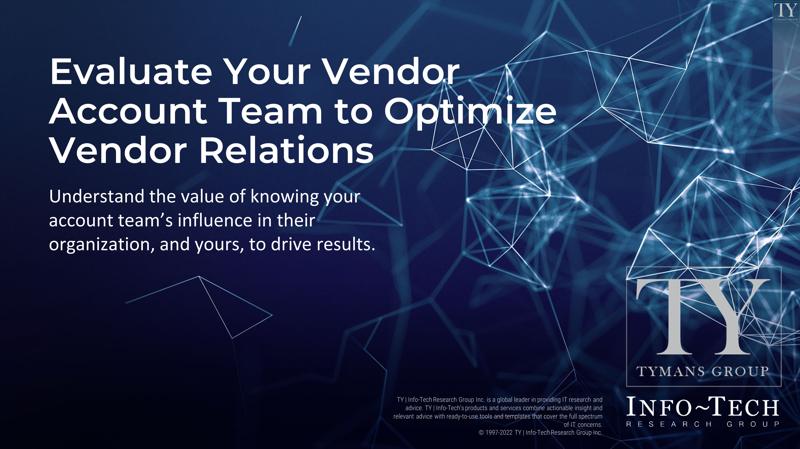
Evaluate Your Vendor Account Team to Optimize Vendor Relations
- Understand how important your account is to the vendor and how it is classified.
- Understand how informed the account team is about your company and your industry.
- Understand how long the team has been with the vendor. Have they been around long enough to have developed a “brand” or trust within their organization?
- Understand and manage the relationships and influence the account team has within your organization to maintain control of the relationship.
Our Advice
Critical Insight
Conducting the appropriate due diligence on your vendor’s account team is as important as the due diligence you put into the vendor. Ongoing management of the account team should follow the lifecycle of the vendor relationship.
Impact and Result
Understanding your vendor team’s background, experience, and strategic approach to your account is key to the management of the relationship, the success of the vendor agreement, and, depending on the vendor, the success of your business.
Evaluate Your Vendor Account Team to Optimize Vendor Relations Research & Tools
Besides the small introduction, subscribers and consulting clients within this management domain have access to:
1. Evaluate Your Vendor Account Team to Optimize Vendor Relations Deck – Understand the value of knowing your account team’s influence in their organization, and yours, to drive results.
Learn how to best qualify that you have the right team for your business needs, using the accompanying tools to measure and monitor success throughout the relationship.
- Evaluate Your Vendor Account Team to Optimize Vendor Relations Storyboard
2. Vendor Rules of Engagement Template – Use this template to create a vendor rules of engagement document for inclusion in your company website, RFPs, and contracts.
The Vendor Rules of Engagement template will help you develop your written expectations for the vendor for how they will interact with your business and stakeholders.
- Vendor Rules of Engagement
3. Evalu-Rate Your Account Team – Use this tool to develop criteria to evaluate your account team and gain feedback from your stakeholders.
Evaluate your vendor account teams using this template to gather stakeholder feedback on vendor performance.
- Evalu-Rate Your Account Team
Further reading
Evaluate Your Vendor Account Team to Optimize Vendor Relations
Understand the value of knowing your account team’s influence in their organization, and yours, to drive results.
Analyst Perspective
Having the wrong account team has consequences for your business.
IT professionals interact with vendor account teams on a regular basis. You may not give it much thought, but do you have a good understanding of your rep’s ability to support/service your account, in the manner you expect, for the best possible outcome? The consequences to your business of an inappropriately assigned and poorly trained account team can have a disastrous impact on your relationship with the vendor, your business, and your budget. Doing the appropriate due diligence with your account team is as important as the due diligence you should put into the vendor. And, of course, ongoing management of the account team relationship is vital. Here we will share how best to qualify that you have the right team for your business needs as well as how to measure and monitor success throughout the relationship.
 |
Donna Glidden
|
Executive Summary
Your Challenge
|
Common Obstacles
|
Info-Tech’s Approach
|
Info-Tech Insight
Understanding your vendor team’s background, their experience, and their strategic approach to your account is key to the management of the relationship, the success of the vendor agreement, and, depending on the vendor, the success of your business.
Blueprint benefits
IT Benefits
|
Mutual IT and
|
Business Benefits
|
Insight Summary
Overarching insight
Conducting the appropriate due diligence on your vendor’s account team is as important as the due diligence you put into the vendor. Ongoing management of the account team should follow the lifecycle of the vendor relationship.
Introductory/RFP phase
|
Contract phase
|
Vendor management phase
|
| Tactical insight
Don’t forget to look at your organization’s role in how well the account team is able to perform to your expectations. |
Tactical insight
Measure to manage – what are the predetermined criteria that you will measure the account team’s success against? |
Lack of adequate sales training and experience can have a negative impact on the reps’ ability to support your needs adequately
(Source: Spotio) | Info-Tech InsightRemember to examine the inadequacies of vendor training as part of the root cause of why the account team may lack substance. |
Why it matters1.8 yearsis the average tenure for top ten tech companies2.6 years is the average experience required to hire. 2.4 years is the average account executive tenure. 44% of reps plan to leave their job within two years. The higher the average contract value, the longer the tenure. More-experienced account reps tend to stay longer. (Source: Xactly, 2021) |
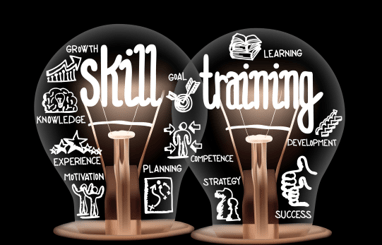 |
Info-Tech Insight
You are always going to be engaged in training your rep, so be prepared.
Before you get started…
|
When you formalize your expectations regarding vendor contact with your organization and create structure around it, vendors will take notice.
Consider a standard intake process for fielding vendor inquiries and responding to requests for meetings to save yourself the headaches that come with trying to keep up with them. Stakeholder teams, IT, and Procurement need to be on the same page in this regard to avoid missteps in the important introductory phase of dealing with vendors and the resulting confusion on the part of vendor account teams when they get mixed messages and feel “passed around.” |
1. Introductory Phase
| If vendors know you have no process to track their activities, they’ll call who they want when they want, and the likelihood of them having more information about your business than you about theirs is significant.
Vendor contacts are made in several ways:
Things to consider:
|
Not every vendor contact will result in an “engagement” such as invitation to an RFP or a contract for business. As such, we recommend that you set up an intake process to track/manage supplier inquiries so that when you are ready to engage, the vendor teams will be set up to work according to your expectations. |
2. RFP/Contract Phase
What are your ongoing expectations for the account team?
|
 |
3. Ongoing Vendor Management
Even if you don’t have a vendor management initiative in place, consider these steps to manage both new and legacy vendor relationships:
|
 |
Info-Tech Insight
What your account team doesn’t say is equally important as what they do say. For example, an account rep with high influence says, “I can get that for you” vs. “I'll get back to you.” Pay attention to the level of detail in their responses to you – it references how well they are networked within their own organization.
How effective is your rep?
|
|||||||||
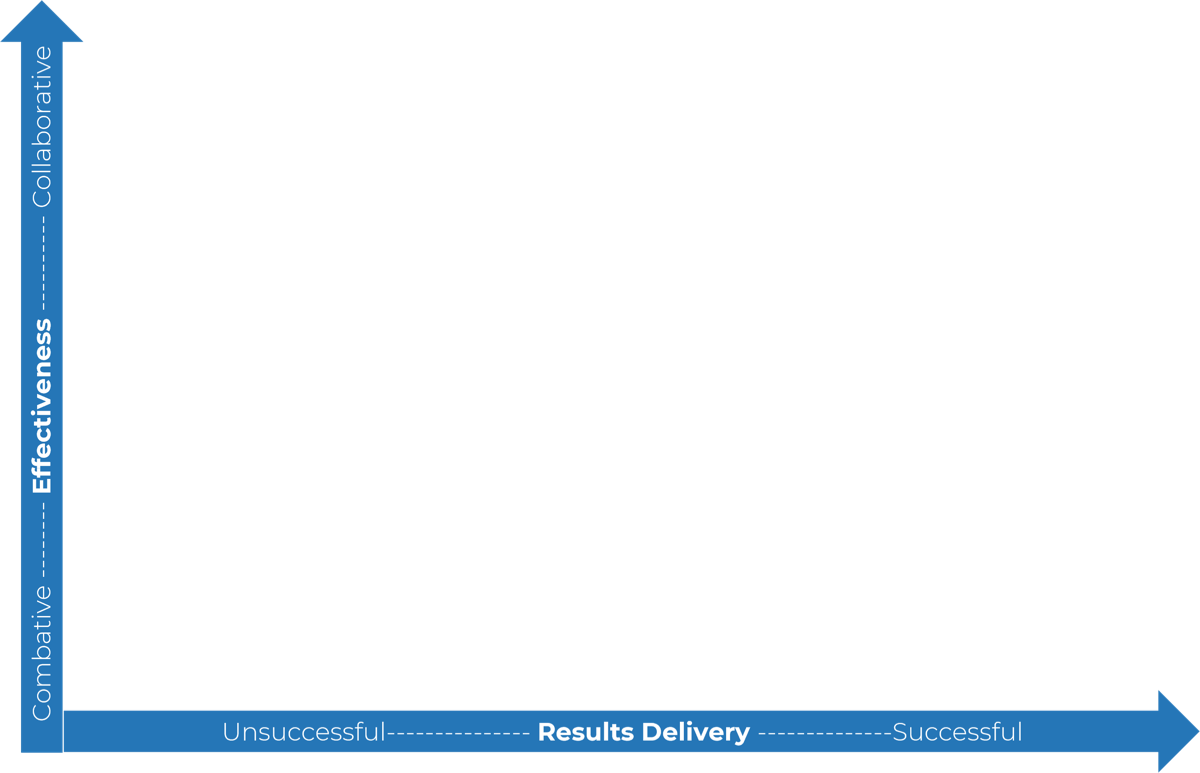 |
|||||||||
Characteristics of account reps
Effective
|
Ineffective
|
How to support an effective rep
|
A little recognition goes a long way in reinforcing a positive vendor relationship. |
Info-Tech Insight
Don’t forget to put the relationship in vendor relationship management – give a simple “Thank you for your support” to the account team from executive management.
How to support an ineffective rep
An ineffective rep can take your time and attention away from more important activities.
|
“Addressing poor performance is an important aspect of supplier management, but prevention is even more so.” (Logistics Bureau) |
Introductory questions to ask vendor reps
|
|
Qualify the account team as you would the vendor – get to know their background and history. |
Vendor rules of engagement
| Articulate your vendor expectations in writing
Clearly document your expectations via formal rules of engagement for vendor teams in order to outline how they are expected to interact with your business and stakeholders. This can have a positive impact on your vendor and stakeholder relationships and enable you to gain control of:
Include the rules in your RFXs and contracts to formalize your expectations. See the Vendor Rules of Engagement template included with this research. Download the Vendor Rules of Engagement template |
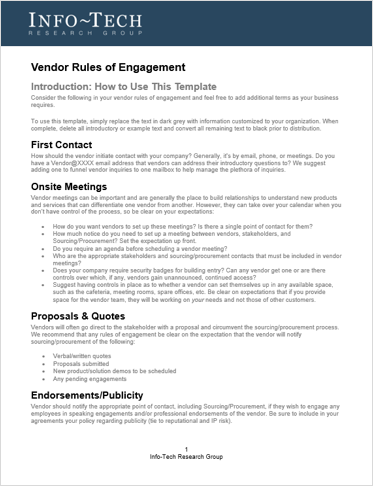 |
Evalu-rate your vendor account team
Measure stakeholder feedback to ensure your account team is on target to meet your needs.
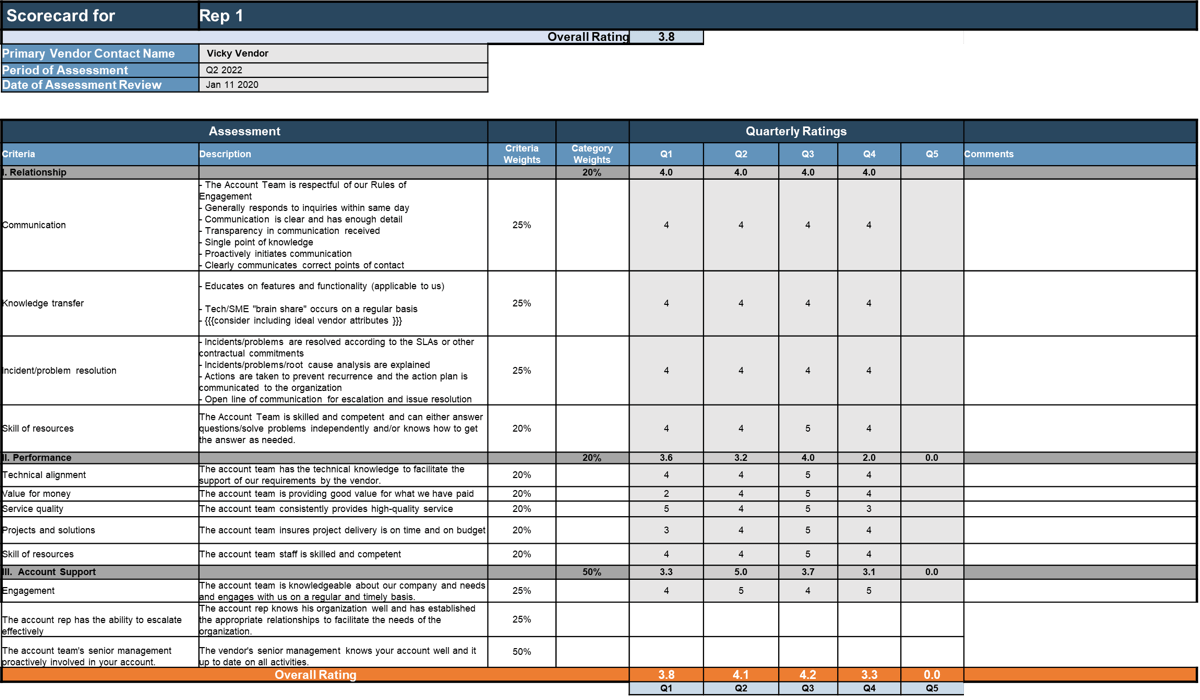 Download the Evalu-Rate Your Account Team tool |
|
Final thoughts: Do’s and don’ts
DO
|
DON'T
|
Summary of Accomplishment
Problem Solved
Upon completion of this blueprint, Guided Implementation, or workshop, your team should have a comprehensive, well-defined, end-to-end approach to evaluating and managing your account team. Leveraging Info-Tech’s industry-proven tools and templates provides your organization with an effective approach to establishing, maintaining, and evaluating your vendor account team; improving your vendor and stakeholder communications; and maintaining control of the client/vendor relationship.
Additionally, your team will have a foundation to execute your vendor management principles. These principles will assist your organization in ensuring you receive the perceived value from the vendor as a result of your vendor account team evaluation process.
If you would like additional support, have our analysts guide you through other phases as part of an Info-Tech workshop.
Contact your account representative for more information.
workshops@infotech.com 1-888-670-8889
Bibliography
“14 Essential Qualities of a Good Salesperson.” Forbes, 5 Oct. 2021. Accessed 11 March 2022.
“149 Eye-Opening Sales Stats to Consider.” Spotio, 30 Oct. 2018. Accessed 11 March 2022.
“35 Sales Representative Interview Questions and Answers.” Indeed, 29 Oct. 2021. Accessed 8 March 2022.
“8 Intelligent Questions for Evaluating Your Sales Reps Performance” Inc., 16 Aug. 2016. Accessed 9 March 2022.
Altschuler, Max. “Reality Check: You’re Probably A Bad Salesperson If You Possess Any Of These 11 Qualities.” Sales Hacker, 9 Jan. 2018. Accessed 4 May 2022.
Bertuzzi, Matt. “Account Executive Data Points in the SaaS Marketplace.” Treeline, April 12, 2017. Accessed 9 March 2022. “Appreciation Letter to Vendor – Example, Sample & Writing Tips.” Letters.org, 10 Jan. 2020. Web.
D’Entremont, Lauren. “Are Your Sales Reps Sabotaging Your Customer Success Without Realizing It?” Proposify, 4 Dec. 2018. Accessed 7 March 2022.
Freedman, Max. “14 Important Traits of Successful Salespeople.” Business News Daily, 14 April 2022. Accessed 10 April 2022.
Hansen, Drew. “6 Tips For Hiring Your Next Sales All-Star.” Forbes, 16 Oct. 2012. Web.
Hulland, Ryan. “Getting Along with Your Vendors.” MonMan, 12 March 2014. Accessed 9 March 2022.
Lawrence, Jess. “Talking to Vendors: 10 quick tips for getting it right.” Turbine, 30 Oct. 2018. Accessed 11 March 2022.
Lucero, Karrie. “Sales Turnover Statistics You Need To Know.” Xactly, 24 Aug. 2021. Accessed 9 March 2022.
Noyes, Jesse. “4 Qualities to Look For in Your Supplier Sales Representative.” QSR, Nov. 2017. Accessed 9 March 2022.
O’Byrne, Rob. “How To Address Chronic Poor Supplier Performance.” Logistics Bureau, 26 July 2016. Accessed 4 May 2022.
O'Brien, Jonathan. Supplier Relationship Management: Unlocking the Hidden Value in Your Supply Base. Kogan Page, 2014.
Short, Alex. “Three Things You Should Consider to Become A Customer of Choice.” Vizibl, 29 Oct. 2021. Web.
Wayshak, Marc. “18 New Sales Statistics for 2022 from Our Groundbreaking Study!” Sales Insights Lab, 28 March 2022. Web.
“What Does a Good Customer Experience Look Like In Technology?” Virtual Systems, 23 June 2021. Accessed 10 March 2022.